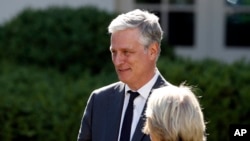Zimbabwe has summoned the U.S. ambassador in Harare to a meeting over comments by a White House official suggesting Zimbabwe is among "foreign adversaries" that could face retaliation for trying to foment unrest in the U.S. over the death of George Floyd, a black man who pleaded for air as a police officer pressed a knee into his neck.
The U.S. ambassador to Zimbabwe, Brian Nichols, has been called to meet with Zimbabwe's foreign minister over comments Sunday by U.S. national security adviser Robert O'Brien, Zimbabwe's state-controlled Herald newspaper reported Monday.
In an interview on ABC's "This Week," O'Brien suggested, without citing any evidence, that Zimbabwe is one of several "foreign adversaries" — including China and Russia — he suggested were taking advantage of the protests in the U.S. to "sow discord and to try and damage our democracy."
"So there will be a response and it will be proportional, but this is not something that -- that our adversaries are going to get away with for free," O'Brien said.
Floyd was killed a week ago in Minneapolis, Minnesota, as a white police officer pressed his knee into Floyd's neck even as he cried he couldn't breathe. One officer has been charged with murder.
His death has sparked a week of protests that turned violent in cities across the U.S.
The Trump administration has portrayed the violence as the work of outside groups and extremists. Officials are investigating whether foreign adversaries are behind a burgeoning disinformation campaign on social media.
Zimbabwean President Emmerson Mnangagwa has not made any official comment on the current crisis in the U.S., but his spokesman George Charambsa and other government supporters have criticized the U.S. on their personal social media accounts.
Zimbabwe's relations with the U.S. have been strained since 2003, when Washington imposed sanctions on several Zimbabwean government leaders over alleged human rights abuses and electoral fraud. The sanctions came after the often violent seizures of white-owned farms by former president Robert Mugabe.
Mnangagwa, Mugabe's successor, is one of the more than 80 Zimbabweans who are sanctioned by the U.S. government, which prevents them from having U.S. bank accounts and traveling to the U.S. Mnangagwa has said he wants to normalize relations with the U.S., but reports of continued human rights abuses have led the U.S to maintain the sanctions.
Although the U.S. sanctions, and similar sanctions by the EU, are against individuals, the measures have prevented large multilateral agencies, such as the World Bank and the IMF, from extending large loans to support Zimbabwe's faltering economy.
Zimbabwe Summons US Envoy Over White House Adviser's Comment




